2021-2022
To view the most recent report on these projects, click here.
Climate Change Initiative Part 2 – $15,000 India
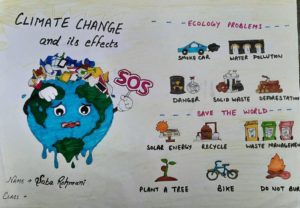

Although women and girls are more likely to be affected by climate change, they will not have equal access to the resources necessary to cope with the consequences. Home to 20% of the world’s girl population, and expected to be one of the countries most affected by climate change, it will be girls in India who are most affected. This partnership is a continuation of the incredible work done by this partnership for the 2020-2021 ICF Grant Cycle to incorporate environmental and climate change learning and community action projects into Shadhika’s existing programming supporting girl leaders.
In this next iteration, they will deepen learning on the intersection of climate justice and gender, safety, and community organizing. Fellows will also be supported and connected with local agencies leading work on environmental sustainability, climate change, or girls’ rights; participate in the Leaders for Change Summit, and complete the Community Action projects they began in 2021.
Organizations: Shadhika, Sayantoni Datta, STOP Organization, Jabala Action Research Organization, Sahiyar
Community-Based Rehabilitation for Children with Amputation due to Cancer – $15,000 Guatemala
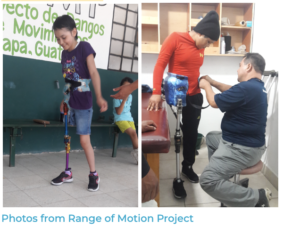 In Guatemala, many children lose a limb due to osteosarcoma (bone cancer), but no public institution provides prosthetic care and community-based rehabilitation services to them. ROMP and Mariano Galvez University have an existing partnership to provide holistic care for adults with amputations. UNOP currently refers pediatric patients to receive prosthetic care from ROMP. In this project, UNOP will refer children with amputation to ROMP, and physical therapy students from UMG will serve as Mobilizers to provide bi-weekly check-ins, and to coordinate physical and mental healthcare, physical therapy, and occupational therapy for five months to each patient. Through this project, these organizations will expand their already impactful partnership to support children with amputations. This initial pediatric cohort will support 15 children to be paired with 15 Mobilizers and aims to be a model for their expansion to all 22 provinces of Guatemala by 2026.
In Guatemala, many children lose a limb due to osteosarcoma (bone cancer), but no public institution provides prosthetic care and community-based rehabilitation services to them. ROMP and Mariano Galvez University have an existing partnership to provide holistic care for adults with amputations. UNOP currently refers pediatric patients to receive prosthetic care from ROMP. In this project, UNOP will refer children with amputation to ROMP, and physical therapy students from UMG will serve as Mobilizers to provide bi-weekly check-ins, and to coordinate physical and mental healthcare, physical therapy, and occupational therapy for five months to each patient. Through this project, these organizations will expand their already impactful partnership to support children with amputations. This initial pediatric cohort will support 15 children to be paired with 15 Mobilizers and aims to be a model for their expansion to all 22 provinces of Guatemala by 2026.
Organizations: Range of Motion Project (ROMP) Guatemala, ROMP USA, Mariano Galvez (UMG) Escuela De Fisioterapia, Unidad Nacional de Oncologia Pediátricia
The Restoration and Protection of Bofedales in Alpaca Herding Communities – $11,000 Peru
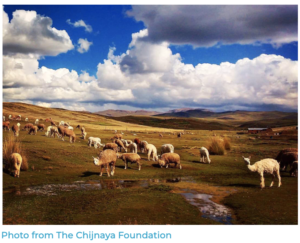 Bofedales, high-altitude wetlands that make alpaca herding possible, are disappearing due to climate change, overgrazing, and economic pressure. The alpaca-herding community members that created Asociacion Wichay are looking to combat the wealth inequalities and create more viable economic opportunities in the alpaca industry. As a first step of this longer-term venture to develop a sustainable hand-spun yarn business, this project will collaborate to restore and protect the natural areas required for alpacas to thrive. In 2022, this collaboration will address water scarcity utilizing the pre-colonial practice of cosecha de aqua, which was historically used in the Andes mountains to ensure secure water supplies for agricultural production, by building canals, berms, swales, and infiltration ditches that direct limited water supplies to strategic areas; strategically rotate the pastures in which animals graze in order to restore and recuperate overgrazed pastures; and introduce native grasses and trees. By training 80 community leaders with the support of a local agronomist, this partnership aims to recuperate and protect 40 hectares of bofedales. Read their final report here >>
Bofedales, high-altitude wetlands that make alpaca herding possible, are disappearing due to climate change, overgrazing, and economic pressure. The alpaca-herding community members that created Asociacion Wichay are looking to combat the wealth inequalities and create more viable economic opportunities in the alpaca industry. As a first step of this longer-term venture to develop a sustainable hand-spun yarn business, this project will collaborate to restore and protect the natural areas required for alpacas to thrive. In 2022, this collaboration will address water scarcity utilizing the pre-colonial practice of cosecha de aqua, which was historically used in the Andes mountains to ensure secure water supplies for agricultural production, by building canals, berms, swales, and infiltration ditches that direct limited water supplies to strategic areas; strategically rotate the pastures in which animals graze in order to restore and recuperate overgrazed pastures; and introduce native grasses and trees. By training 80 community leaders with the support of a local agronomist, this partnership aims to recuperate and protect 40 hectares of bofedales. Read their final report here >>
Organizations: The Chijnaya Foundation, Association for Integral Development of the Altiplano in Peru (The Pro-DIA Association), Asociación Wichay
I am a Green Leader – $20,000 Uganda
PB and K Family Foundation Annual Environment Grant
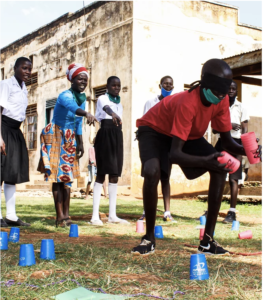
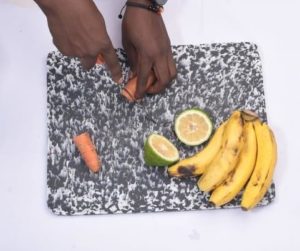 This project will be tackling two intersecting issues: youth unemployment and low recycling rates. The Recreation Project team will pair their existing programs on life skills and social innovation/ entrepreneurship with training on plastic recycling from TakaTaka Plastics. Throughout one year, 120 students will establish plastic recycling collection points in their communities and start environmental protection social entrepreneurship projects of their own – reclaiming 8 tons of plastic that otherwise would not have been recycled. Takataka will then buy the plastic collected by the youth groups for their line of recycled plastic products, providing new life for this pollutant and financial support and employment opportunities for the youth participants.
This project will be tackling two intersecting issues: youth unemployment and low recycling rates. The Recreation Project team will pair their existing programs on life skills and social innovation/ entrepreneurship with training on plastic recycling from TakaTaka Plastics. Throughout one year, 120 students will establish plastic recycling collection points in their communities and start environmental protection social entrepreneurship projects of their own – reclaiming 8 tons of plastic that otherwise would not have been recycled. Takataka will then buy the plastic collected by the youth groups for their line of recycled plastic products, providing new life for this pollutant and financial support and employment opportunities for the youth participants.
Organizations: The Recreation Project (TRP), TakaTaka Plastics
2020-2021
Replication as a Pathway to Scaling Up – $20,000 Uganda
Small grassroots development organizations often struggle to scale up their programs, especially when maintaining the integrity of local community mobilizing and development. Both Africa Development Promise (ADP) and Into Your Hands Africa (IYHA) have a common understanding of issues that Ugandan women in rural communities face but have different yet complementary approaches to solving them. Rather than expanding, ADP and IYHA recognize unique strengths that each party brings to the collaborative process. Having successfully partnered on organizational efficiency in the past and as requested by each partner’s constituents, ADP and IYHA will deepen their partnership for ongoing learning, and to replicate and scale each organization’s respective programs.
PB and K Family Foundation Annual Environmental Grant: Awareness About Climate Change as a Girls’ Rights Issue – $20,000 India
Although women and girls are more likely to be affected by climate change, they will not have equal access to the resources necessary to cope with the consequences. Home to 20% of the world’s girl population, and expected to be one of the countries most affected by climate change, it will be girls in India who are most affected. Through this partnership, Shadhika will expand their work to include climate change, partnering with local organizations including Vitamin Stree, Sayantoni Datta Consulting Services, Jabala Action Research Organization, Sahiyar, STOP NGO, & Milaan Foundation. Together, they will develop a common curriculum to address the impact of climate change on girls’ rights in India.
2019
Arrow Innovation in Technology Grant: Moving Up the Coffee Value Chain via Blockchain – $20,000 Honduras
With all the buzz around blockchain technology in the private sector, this project, led by iDE in collaboration withBext360, will provide tangible experiences and lessons learned as evidence of how blockchain can be applied to market-based interventions in global development. By directly linking farmers in Honduras to roasters in the United States, iDE and Bext360 seek to improve supply chain transparency through blockchain technology to address market failures. Their partnership serves as a model for connecting coffee producers and buyers with financial and agricultural technology solutions and the project is a continued evolution of market-based approaches to poverty reduction.
PB and K Family Foundation Annual Environmental Grant: Evaluating Cultural-Environmental Impact through Participatory Research with the Navajo Nation – $13,000 Navajo Nation
There is a long history of natural resource extraction from native lands in the United States. In recent years, fracking has been rapidly expanding across the Navajo Nation, with limited research and tribal policymaking to address the challenges. Using methodology based in an indigenous perspective, this partnership brings together faculty and students from Regis University Master of Development Practice, Colorado School of Mines Humanitarian Engineering Program and Diné College on the Navajo Nation for an immersive workshop on environmental research. The Regis contingent includes students from Ghana and Rwanda, making this team truly (and intentionally) cross-cultural. Their joint learning will form the basis for launching a course on indigenous and grassroots activism.
Simple and Scalable Upgrade to AFRIDEV Handpump – $16,500 Malawi
The AFRIDEV handpump was designed in the 1980s as a simple lever hand pump that allowed communities to access groundwater, and could be repaired and maintained locally. It is estimated there are tens of thousands of these pumps across Africa. The part with the shortest lifespan is a plastic sleeve at the main pivot of the pump; damage to this part can render the pump useless and leave communities without safe access to water. Engineers Without Borders USA and Freshwater Project International are coming together to design and test a steel replacement for the part that could greatly extend the life of AFRIDEV handpumps. This simple innovation has the potential for scalability and provides a modern upgrade to an important source of water for rural communities across Africa and beyond.
Feasibility Study for Solar Product Distribution – $15,000 Zambia
Access to electricity is essential for economic livelihoods, health, safety, education, and quality of life, yet only 3% of rural Zambians have electricity. Elephant Energy (EE) and iDE are teaming up to lead a feasibility study to determine if and how a partnership between the organizations can address energy poverty across Zambia. They will explore the potential of integrating EE’s appropriate sustainable energy technologies into iDE’s expansive Zambian Farm Business Advisor network, a partnership that could simultaneously support EE’s mission to create access to energy and increase the income of iDE’s network of entrepreneurs. This study will enable a data-driven approach to future partnership and serves as a blueprint for strategic alliances to meet pressing development challenges.
A Data-Driven Approach to Women’s Entrepreneurship – $15,000 Pakistan
Women’s economic opportunity and workforce participation in Pakistan is among the lowest in the world. The advancement of women and girls is widely acknowledged to be a key driver of development; investments in this arena yield many benefits. This partnership features a strategic collaboration between Marshall Direct Fund and their Pakistani NGO Moqah Foundation, along with experienced global entrepreneurship trainers, Alternativ Global Entrepreneurs (AGE). Together, they will translate AGE’s curriculum into Urdu, identify and train future program leaders, and conduct several 40-hour entrepreneurship trainings. Using the ForGood platform, they will collect short, medium, and long-term data on key indicators and will compare the outcomes of this project with those of other women’s entrepreneurship programs to fine tune and improve this long-term partnership.
2018
Well-Siting Meter: Agricultural Water for All – $10,000 Cameroon and the United States
Across much of the world, wells provide much needed access to water. Identifying the right location for wells is an essential aspect of providing ongoing access to water. Conventional instruments used to identify the best location for a well cost between $6,000 and $40,000 and require a highly-skilled operator, essentially making successful well drilling inaccessible for local NGOs. This partnership is comprised of engineers, makers, and software developers from Global Hope Network International, Mike MacCarthy, JustDesign LLC, and H2Optimal Inc. They will prototype and test a low-cost, open-source well-siting meter, in order to maximize successful well installation by rural farmers. Detailed instructions for developing the meter and building appropriate casing for the meter will be widely distributed for broader use.
Accelerator Bootcamp for Social Enterprises – $20,000
iDE is founded upon the idea that business has the power to solve poverty. They currently have programs in eleven countries across Africa, Asia, and Central America. GAN is a leader in supporting startups to build successful businesses. Together, they plan to run an accelerator bootcamp to launch iDE’s existing social enterprises to new heights. They will run a competitive selection process among iDE’s social enterprises, design, and implement a one-day accelerator bootcamp to be held in April 2018. Selected social enterprises will emerge with a road map for business success, and will play an integral role in iDE’s strategic goal to reach 20 million more people in the next five years.
Stronger Together: Developing Cross-Border Authentic Girls’ Empowerment – $10,000 Guatemala and Denver
Across the Posner Center network and the broader development sector, trips to see NGO operations in other countries are common practice, intended to generate awareness, connection, and financial support. Despite an increased emphasis on conscious travel, little rigorous work has been done to explore the learning of and benefits to all individuals, travelers and hosts alike. Starfish, an NGO working in Guatemala, is partnering with Envoys, a leader in global education, to plan, execute, and evaluate a trip engaging students from Denver’s Girls Athletic Leadership School (GALS) with Starfish’s Girl Pioneers. They will research, develop, and pilot a tool for evaluating the benefit of travel for all participants and plan to share their findings with the Posner Center network and beyond.
Kupanda Girls’ Junior Community Health Education Program – $10,000 Tanzania
In 2015, Tanzania made lower secondary school education free. Despite this change, graduation rates, particularly for girls, remain abysmally low. In response, the Africa School Assistance Project (ASAP) started the Kupanda Project for Girls, a holistic program aimed at addressing the various barriers girls face in receiving an education. The Maji Safi Group will collaborate with ASAP to train girls from the Kupanda Project to become community health educators in school water, sanitation, and hygiene (SWASH) and in menstrual hygiene management (MHM). This train-the-trainer model will strengthen the leadership skills of the Kupanda Project students, expand SWASH and MHM knowledge of primary- aged students, and create broader community awareness and skills for improved health.
